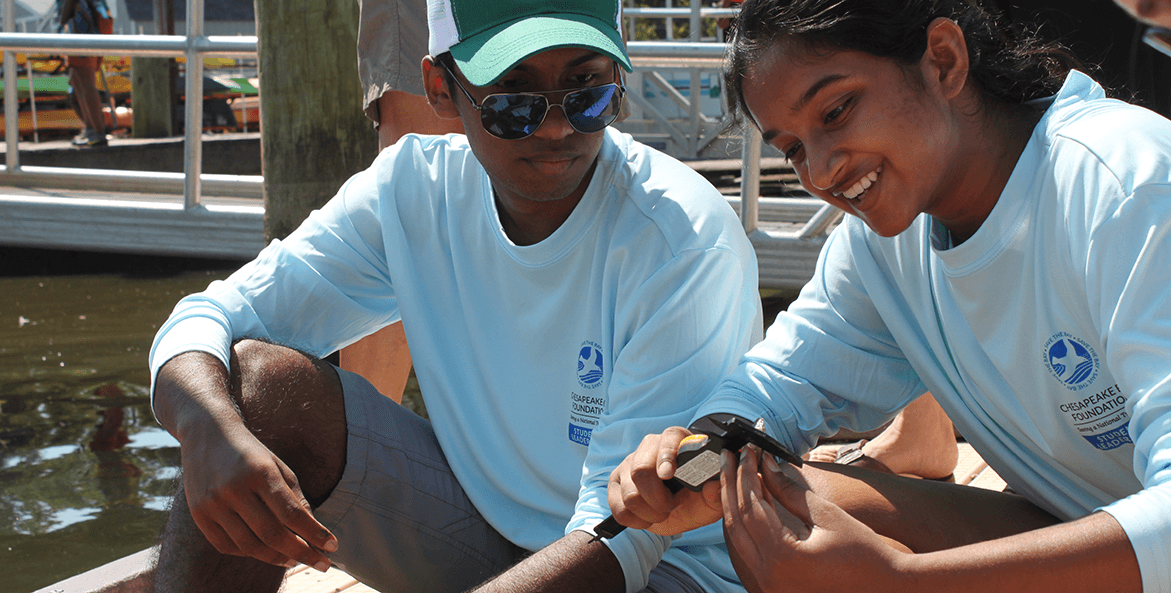This op-ed originally ran in Maryland Matters.
As schools rethink their learning strategies in response to the COVID-19 pandemic, now is the opportunity to include more outdoor learning.
Most large public school systems in Maryland are developing remote learning plans for at least the fall semester in response to the ongoing pandemic. Continued remote learning will exacerbate challenges that cropped up at the end of the last school year.
Teachers and students reported burnout and frustration from adapting to remote learning as well as increasing numbers of students disconnecting. However, getting students outside as they learn on their own can be a way to reduce these difficulties. Numerous studies have shown that students who learn outside are more motivated, self-directed and have less anxiety than students who don’t have those opportunities.
At the Chesapeake Bay Foundation, we believe the outdoors are an ideal location for learning—especially to learn about the environment. For more than 40 years we’ve taken students from across the bay watershed on our boats and canoes to explore wetlands, fish, examine oysters and test water quality.
These experiences have shown us how students engage and establish connections with nature by learning outside. It’s easy to see this happen through the students’ smiles when they’re holding a striped bass or paddling a canoe. Our own observations are backed by extensive research.
A study comparing the same lessons taught inside and outside published in Frontiers in Psychology in 2018 concluded, “lessons in nature boost subsequent classroom engagement, and boost it a great deal; after a lesson in nature, teachers were able to teach for almost twice as long without having to interrupt instruction to redirect students’ attention.”
Keeping students engaged will be key to making remote learning a success this fall. Even more, students develop a passion for learning when educated about their natural environment, according to other research.
“There is no doubt that environmental education is one of the most effective ways to instill a passion for learning among students,” concluded Stanford professor Nicole Ardoin after reviewing more than 100 studies on environmental education.
Unfortunately, due to group-gathering restrictions, CBF is currently unable to take classes on our traditional field experiences that combine environmental education and the outdoors.
That’s why we’re calling on education leaders to find new ways to encourage students to learn outside, as they develop how schools will operate this fall. We can’t reasonably expect students to stay engaged with school if it’s limited to what you can do while staring at a screen.
At CBF we’ve adapted to new learning strategies by creating more than two dozen videos paired with written investigations for our new and free Learn Outside, Learn at Home education series. After watching one of the educator-led short videos, the investigations ask students to head into their backyard, local park or other areas in their neighborhood to explore questions about their environment.
The questions they’ll answer will help them understand how a storm drain works, identify invasive species, appreciate the benefits of trees and, ideally, help them solve environmental issues in their community. These are self-led outdoor education experiences that provide students with real-world scientific knowledge about their neighborhood.
Each day CBF is continuing its work to advocate for policy changes to improve water and air quality. When those efforts don’t work, we also litigate court cases to force change. However, we know the backbone of our organization is education. If the public doesn’t understand the harmful effects of excessive fertilizer, why we’re fighting for more protections of forests, or opposing development near shorelines—then our advocacy and litigation efforts will be more difficult.
That’s why CBF invests so much of our time and effort into educating each generation. Since our education program launched in 1968, we’ve provided field education experiences to more than a million students throughout the bay’s watershed. We’re not going to stop because of a pandemic.
We’re here to help any school district, teacher or parent interested in identifying ways to incorporate outdoor learning into their education programs. This fall we’ll also be rolling out curated programs for teachers and school systems that focus on specific environmental subjects and grade levels to add to their remote learning programs.
The bottom line is students learn better when they’re outside. Let’s work to continue to give them that opportunity by incorporating outdoor learning and environmental lessons in remote education plans.



